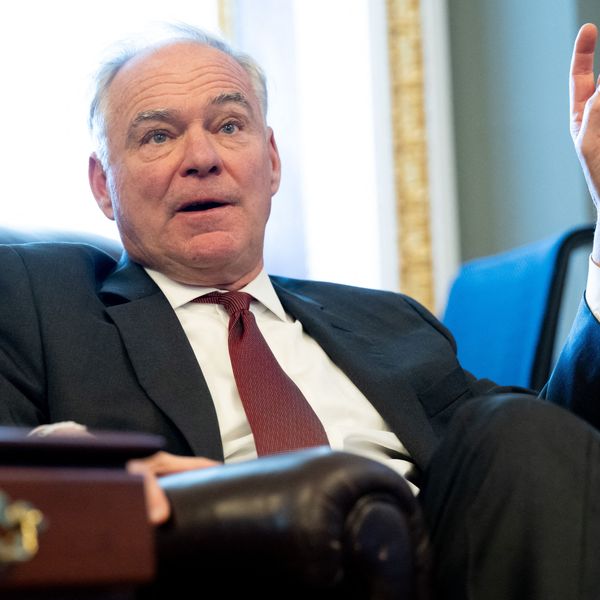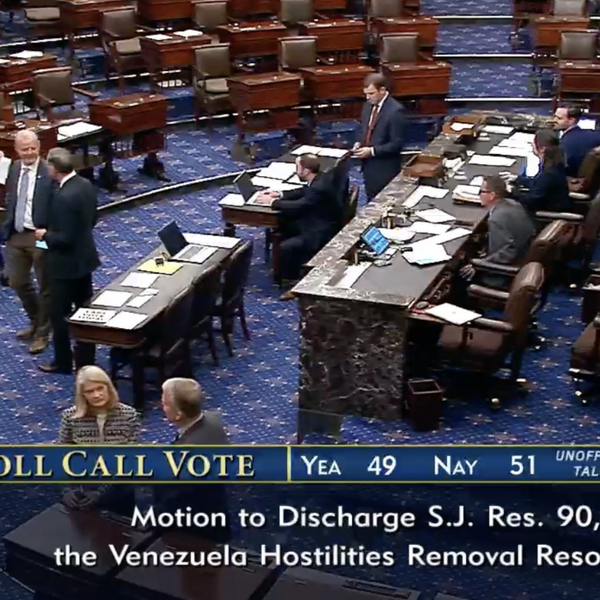Obama on Presidential War-Making Powers
The U.N. Security Council Resolution authorizing military force in Libya does not, on its face, compel U.S.
The U.N. Security Council Resolution authorizing military force in Libya does not, on its face, compel U.S. involvement, but news reports (and common sense) suggest that American participation is likely. That has led to debates over whether the President is constitutionally empowered to order military action in Libya without Congressional approval, whether it be in the form of a declaration of war or at least some statutory authorization to use military force (my views on the substance of this new war are here).
I will simply never understand the view that the Constitution allows the President unilaterally to commit the nation to prolonged military conflict in another country -- especially in non-emergency matters having little to do with self-defense -- but just consider what candidate Barack Obama said about this matter when -- during the campaign -- he responded in writing to a series of questions regarding executive power from Charlie Savage, then of The Boston Globe:
Q. In what circumstances, if any, would the president have constitutional authority to bomb Iran without seeking a use-of-force authorization from Congress? (Specifically, what about the strategic bombing of suspected nuclear sites -- a situation that does not involve stopping an IMMINENT threat?)
OBAMA: The President does not have power under the Constitution to unilaterally authorize a military attack in a situation that does not involve stopping an actual or imminent threat to the nation.
As Commander-in-Chief, the President does have a duty to protect and defend the United States. In instances of self-defense, the President would be within his constitutional authority to act before advising Congress or seeking its consent.
Obama's answer seems dispositive to me on the Libya question: "The President does not have power under the Constitution to unilaterally authorize a military attack in a situation that does not involve stopping an actual or imminent threat to the nation." And he went on to say that the President could constitutionally deploy the military only "in instances of self-defense." Nobody is arguing -- nor can one rationally argue -- that the situation in Libya constitutes either an act of "self-defense" or the "stopping of an actual or imminent threat to the nation." How, then, can Obama's campaign position possibly be reconciled with his ordering military action in Libya without Congressional approval (something, it should be said, he has not yet done)?
Read the full article at Salon.com
An Urgent Message From Our Co-Founder
Dear Common Dreams reader, The U.S. is on a fast track to authoritarianism like nothing I've ever seen. Meanwhile, corporate news outlets are utterly capitulating to Trump, twisting their coverage to avoid drawing his ire while lining up to stuff cash in his pockets. That's why I believe that Common Dreams is doing the best and most consequential reporting that we've ever done. Our small but mighty team is a progressive reporting powerhouse, covering the news every day that the corporate media never will. Our mission has always been simple: To inform. To inspire. And to ignite change for the common good. Now here's the key piece that I want all our readers to understand: None of this would be possible without your financial support. That's not just some fundraising cliche. It's the absolute and literal truth. We don't accept corporate advertising and never will. We don't have a paywall because we don't think people should be blocked from critical news based on their ability to pay. Everything we do is funded by the donations of readers like you. Will you donate now to help power the nonprofit, independent reporting of Common Dreams? Thank you for being a vital member of our community. Together, we can keep independent journalism alive when it’s needed most. - Craig Brown, Co-founder |
The U.N. Security Council Resolution authorizing military force in Libya does not, on its face, compel U.S. involvement, but news reports (and common sense) suggest that American participation is likely. That has led to debates over whether the President is constitutionally empowered to order military action in Libya without Congressional approval, whether it be in the form of a declaration of war or at least some statutory authorization to use military force (my views on the substance of this new war are here).
I will simply never understand the view that the Constitution allows the President unilaterally to commit the nation to prolonged military conflict in another country -- especially in non-emergency matters having little to do with self-defense -- but just consider what candidate Barack Obama said about this matter when -- during the campaign -- he responded in writing to a series of questions regarding executive power from Charlie Savage, then of The Boston Globe:
Q. In what circumstances, if any, would the president have constitutional authority to bomb Iran without seeking a use-of-force authorization from Congress? (Specifically, what about the strategic bombing of suspected nuclear sites -- a situation that does not involve stopping an IMMINENT threat?)
OBAMA: The President does not have power under the Constitution to unilaterally authorize a military attack in a situation that does not involve stopping an actual or imminent threat to the nation.
As Commander-in-Chief, the President does have a duty to protect and defend the United States. In instances of self-defense, the President would be within his constitutional authority to act before advising Congress or seeking its consent.
Obama's answer seems dispositive to me on the Libya question: "The President does not have power under the Constitution to unilaterally authorize a military attack in a situation that does not involve stopping an actual or imminent threat to the nation." And he went on to say that the President could constitutionally deploy the military only "in instances of self-defense." Nobody is arguing -- nor can one rationally argue -- that the situation in Libya constitutes either an act of "self-defense" or the "stopping of an actual or imminent threat to the nation." How, then, can Obama's campaign position possibly be reconciled with his ordering military action in Libya without Congressional approval (something, it should be said, he has not yet done)?
Read the full article at Salon.com
The U.N. Security Council Resolution authorizing military force in Libya does not, on its face, compel U.S. involvement, but news reports (and common sense) suggest that American participation is likely. That has led to debates over whether the President is constitutionally empowered to order military action in Libya without Congressional approval, whether it be in the form of a declaration of war or at least some statutory authorization to use military force (my views on the substance of this new war are here).
I will simply never understand the view that the Constitution allows the President unilaterally to commit the nation to prolonged military conflict in another country -- especially in non-emergency matters having little to do with self-defense -- but just consider what candidate Barack Obama said about this matter when -- during the campaign -- he responded in writing to a series of questions regarding executive power from Charlie Savage, then of The Boston Globe:
Q. In what circumstances, if any, would the president have constitutional authority to bomb Iran without seeking a use-of-force authorization from Congress? (Specifically, what about the strategic bombing of suspected nuclear sites -- a situation that does not involve stopping an IMMINENT threat?)
OBAMA: The President does not have power under the Constitution to unilaterally authorize a military attack in a situation that does not involve stopping an actual or imminent threat to the nation.
As Commander-in-Chief, the President does have a duty to protect and defend the United States. In instances of self-defense, the President would be within his constitutional authority to act before advising Congress or seeking its consent.
Obama's answer seems dispositive to me on the Libya question: "The President does not have power under the Constitution to unilaterally authorize a military attack in a situation that does not involve stopping an actual or imminent threat to the nation." And he went on to say that the President could constitutionally deploy the military only "in instances of self-defense." Nobody is arguing -- nor can one rationally argue -- that the situation in Libya constitutes either an act of "self-defense" or the "stopping of an actual or imminent threat to the nation." How, then, can Obama's campaign position possibly be reconciled with his ordering military action in Libya without Congressional approval (something, it should be said, he has not yet done)?
Read the full article at Salon.com

